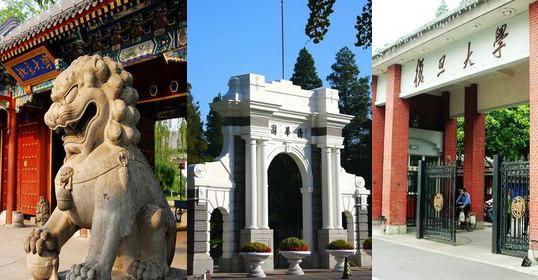Top 20 universities in China 2012: RUC
- By Zhang Junmian
 0 Comment(s)
0 Comment(s) Print
Print E-mail China.org.cn, June 1, 2012
E-mail China.org.cn, June 1, 2012
The trio of Peking University, Tsinghua University and Fudan University remain China's best universities in 2012 for the fifth consecutive year, according to the ranking of 50 key universities in China as recently released by the Institute of Higher Education at Renmin University of China (RUC), a key comprehensive and research-orientated university based in Beijing.
The ranking, the fifth edition of its kind, measures the core competitiveness and social influence of more than 80 top universities on a weight ratio of 60/40. The indicators covered by the core competitiveness sector include discipline rankings (40 percent) and research paper citations (20 percent), while social influence sector assesses average scores in the national college entrance examination (30 percent), Internet popularity index (5 percent) and attraction to international students (5 percent).
The ranking is a non-profit and non-commercial, initiated with the aim of displaying the current situation of China's higher education and development trend, and helping the public to form an accurate understanding of Chinese universities. Due to data limitations, it only includes the universities directly under the Ministry of Education (MOE), Ministry of Industry and Information Technology (MIIT) and the Chinese Academy of Sciences (CAS).
When compared with 2011, the rankings of the top 50 universities in 2012 remain rather stable. Of the top 10, except Shanghai Jiao Tong University (SJTU) which climbed one spot to 7th and the University of Science and Technology of China (USTC) which slipped one spot to 8th, other universities witnessed no changes in their rankings this year.
Generally speaking, steadiness is the most distinctive feature of the ranking over the past five years. The ranking also indicates that much needs to be done to help China's education achieve balanced development, although universities in the western part of China have achieved substantial progress. It's also been found that universities in big cities such as Beijing and Shanghai are popular among students taking the Gaokao – the national college entrance examination.
In terms of average scores in the national college entrance examination, Tsinghua University, Peking University and Fudan University received the highest scores.
The studies carried out by the research group for the ranking show that universities in the western part of China are becoming more popular with international students, thanks to the preferential policies enabling more allocation of education resources to the region, arrangement of special courses and majors at university, lower costs on studies and living, and the region's natural beauty. In 2010, the number of international students (not including short-term trainees) received by the western part of China increased by 21 percent, twice that of the eastern part and 5 times that of the central part.
It's interesting to see that all of the newly appointed 12 presidents at these universities in 2011 are males with doctorate degrees. They are 52 years old on average, 6 years younger than the average age of presidents for universities in the U.S. Seven of them have an educational background in the science and engineering field, and the others are from agriculture, economics and management fields.
The doctoral programs at China's top universities are expanding rapidly. At these universities, there are more than 1,019 newly set-up doctoral programs in 2011, with as many as 60 at one single university.
The following are the top 20 universities in China ranked by the RUC in 2012:
China Agricultural University 中国农业大学
Rank 2012: 20; Rank 2011: 20
Overall score: 73.73
National discipline ranking: 77.04
Quantity and structure of national key disciplines: 76.42
Research paper citations: 73.68
Average scores in national college entrance examination: 73.53
Internet popularity (university name search index and university president search frequency): 64.74
Attraction to international students: 61.36
Website: http://oir.cau.edu.cn/view_en/index.php
Located in Haidian District, Beijing, China Agricultural University (CAU) is the fountainhead for China's modern agricultural higher education and the top institution in China for agricultural studies. Its history can be traced back to 1905, when the College of Agriculture was founded at the former Jingshi Da Xuetang, the predecessor of today's Peking University. The university specializes in agriculture, biology, engineering, veterinary medicine, economics, management, humanities and the social sciences. In 1995, the new CAU was developed through the merger of the Beijing Agricultural University and the Beijing Agricultural Engineering University. Presently, the university offers 64 undergraduate programs, 171 masters' programs and 95 doctoral programs in 14 academic schools. It also has 12 post-doctoral mobile stations.








Go to Forum >>0 Comment(s)